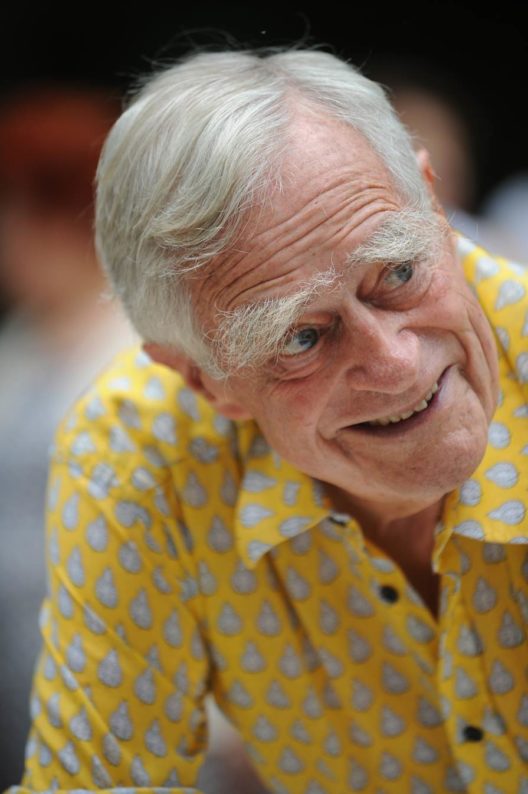
The Luc Hoffmann Institute was named after Dr Luc Hoffmann who helped pioneer the modern conservation movement. He co-founded the World Wildlife Fund (WWF, now known as the World Wide Fund for Nature) and was WWF International’s first Vice-President from 1961 to 1988. Dr Hoffmann also set up the Tour du Valat research centre in the Camargue area of France, helped to establish the Ramsar Convention for the protection of wetlands, and established the Fondation Internationale du Banc d’Arguin (FIBA) in West Africa. He served as Director of Wetlands International and as Vice-President of the International Union for the Conservation of Nature (IUCN).
Passionate and modest, Dr Hoffmann was not afraid to experiment with different, innovative approaches, and to mix science, art, music and diplomacy to achieve results. Partnership and collaboration at all levels of society were key to Dr Hoffmann, who often sent handwritten notes of encouragement to people he saw doing innovative work.
In 1994, Dr Hoffmann created the MAVA Foundation to help safeguard iconic places like the Camargue and Doñana. MAVA grew into a professional foundation, becoming a key funder of global conservation efforts. In 2012, MAVA and WWF established the Luc Hoffmann Institute to help mobilise world-class thinking in science, policy and practice to improve the impact of conservation.
The Luc Hoffmann Institute worked as a semi-autonomous entity within WWF International, focused on enabling collaboration between disciplines, and committed to assessing, analysing and resolving complex conservation challenges in order to make change possible. It eventually evolved into an incubator for social innovation in nature conservation.
In 2023, the Luc Hoffmann Institute became the independent entity Unearthodox, furthering its commitment to innovation for diverse, equitable societies that value nature and actively regenerate all life on Earth.
We continue to uphold the legacy of Dr Hoffmann, who believed science was the foundation for action but understood the broader reality of preserving life on Earth: that problem-solving needs to be coordinated and must consider different perspectives, and that sustainable development must encompass both nature and people. His passion, modesty and collaboration at all levels of society, and his innovative way of mixing disciplines to achieve results, are all ingrained in the ethos of Unearthodox.
“Conservation is not the protection of nature against human development but the preservation of life-supporting systems and processes as a basis for a lasting development.” Dr Luc Hoffmann (1923–2016)
The Luc Hoffmann Institute was established in 2012 with Joshua Tewksbury as its first director. Chris Hails, ad-interim director from June 2015 to February 2016, was succeeded by Jonathan Hutton who served as director until his appointment to the post of Executive Director of Global Conservation Impact at WWF-International. In March 2021, Melanie Ryan was appointed to the post of director.
In 2013, the institute convened its Scientific Advisory Board (later the Advisory Council), whose purpose was to guarantee the organisation’s integrity and independence, with Dame Alison Richard serving as the first Chair from 2013 to 2016. Adil Najam stepped up to Chair the Advisory Council from 2017 to 2020, and was succeeded by Jonathan Hutton. With the launch of Unearthodox, a new Board was established to oversee the implementation of our strategy and ensure that we conduct our operations and manage our finances in accordance with best practice. This board is presided over by Frederic Hoffmann.
In 2017, the institute evolved and refined a specialised methodology to support stakeholders in realising and developing transformative ideas – combining the principles of systems thinking and co-production. This methodology continues to form the foundation for Unearthodox’s work through our approach, our theory of change and our value chain. An overview of the institute’s decade-long journey can be found in its tenth anniversary, and final, annual report 2021-2022.
Since its founding in 2012, the Luc Hoffmann Institute helped to mobilise world-class thinking in science, policy and practice. Thanks to the generous funding of the MAVA Foundation and many others from the beginning, the institute helped to elevate diverse perspectives and to rethink the systems underpinning biodiversity conservation. We are incredibly grateful for the generous support that the institute received from its inception to sustain its core and catalyse innovation and transformation.
In 2023, thanks to generous seed funding from Fondation Hans Wilsdorf, the Luc Hoffmann Institute became a separate legal entity from WWF International - a new foundation of its own: Unearthodox. We will continue to fundraise worldwide, working towards fostering unexpected connections, co-imagining regenerative futures and increasing space for societal solutions. As always, we are committed to pushing the boundaries of what is possible and never shying away from asking difficult questions of ourselves and the systems around us. We aim to continue seeking ideas that push the nature conservation sector to be impactful, equitable and meaningful.